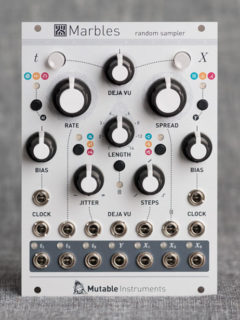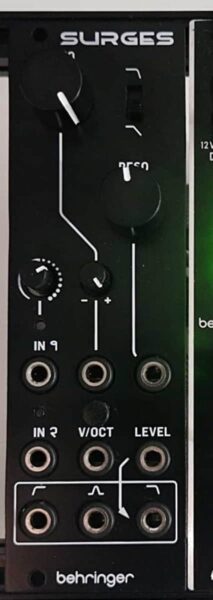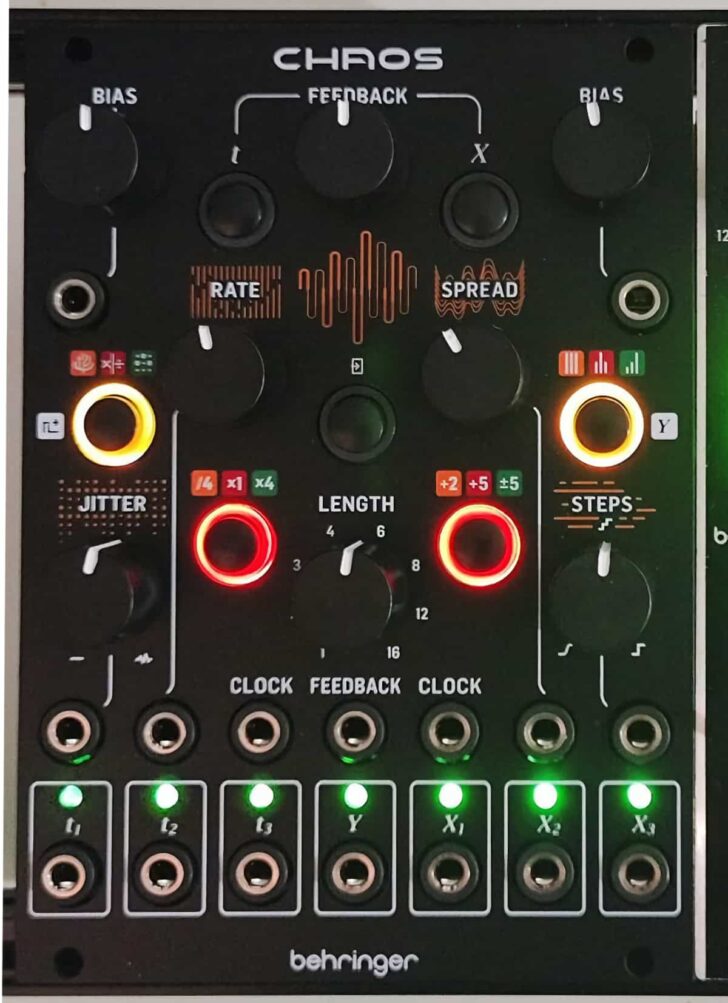
Does Behringer plan to clone the entire Mutable Instruments line?
That’s the question raised by their latest introductions – a pair of Eurorack modules that are clones of recently retired designs by Mutable Instruments.
The first module, ‘Chaos‘, is based on the Mutable Instruments Marbles.
Marbles is described as a ‘random sampler’, and has a variety of features, designed to bring an element of randomness into your patches.
Functions include:
- Master clock
- Two-channel random rhythm generator
- Random voltage generator
- Quantized or smooth… CV Post-processor
- Programmable quantizer
- Output diversity
- Random looping and shuffling
- External CV processing
 The second new Behringer Eurorack module is Surges, based on the Mutable Instruments Ripples.
The second new Behringer Eurorack module is Surges, based on the Mutable Instruments Ripples.
Ripples is an analog multi-mode filter that offers two inputs, one transparent and clean, and one with a drive control that can saturate and distort incoming signals. It features high pass, low pass, and band pass filter outputs. The band pass and low pass outputs are switchable between two and four-pole operation, giving two flavors of cutoff slope. The resonance setting sets the slope of the high pass filter.
Ripples can self-oscillate at higher resonance settings, and tracks 1v/oct over four octaves. Increasing resonance doesn’t cause the output volume to drop like some analog filters.
The low pass filter output passes through a final output VCA, so it can be used similarly to classic East-coast low-pass gate modules.
Is Behringer cloning the entire Mutable Instruments line?
The latest introductions suggest that Behringer may be planning to clone the entire Mutable Instruments line.
If they do, it won’t be the first time that they’ve copied a competitor’s line wholesale. Recent examples include their ‘Boogerfooger’ knockoffs of the Moog Moogerfoooger line and their copies of classic Roland synths and drum machines.
Something that’s different here, though, is that Mutable Instruments has released their module designs as open source projects.
Mutable has released their hardware designs using a Creative Commons license (cc-by-sa-3.0), which basically requires three things:
- Attribution — You must give appropriate credit, provide a link to the license, and indicate if changes were made. You may do so in any reasonable manner, but not in any way that suggests the licensor endorses you or your use.
- ShareAlike — If you remix, transform, or build upon the material, you must distribute your contributions under the same license as the original.
- No additional restrictions — You may not apply legal terms or technological measures that legally restrict others from doing anything the license permits.
Mutable Module firmware is also released under open source licenses. Details are available at their Github page.

This is the third Behringer clone of a Mutable Instruments module and it looks like the company is taking a systematic approach to these copies.
The two new modules follow an earlier Behringer Mutable Instruments clone, Brains, their take on MI’s Peaks Eurorack module. The new modules use the same panel style that Behringer introduced with Brains, using the same color scheme, fonts, etc. Their recently announced XAOC Batumi knockoff uses the same look, which confuses the issue.
Behringer has not explicitly announced plans to copy the Mutable Instruments line, but typically their plans are revealed through product introductions, vs announcements.
The Brains module is currently available. Details on pricing and availability for the two newly introduced modules are still to be announced.
Do you think Behringer is planning an entire line of Mutable Instruments clones? Share your thoughts in the comments!


But Brains.. based not on Peaks, based on Plaits..
Answering your inflammatory question: the technical answerc is NO, they are not. Warm regards
imho they fkd up Marbles. changing the LED color sequence is verboten, as is hiding bi-color LED behind a translucent lens making the LED junctions impossible to observe for color blind folks. no sale. beside, I already have four Marbles.
Wow. One day you’ll have a whole bag of marbles, and you’ll be able to play with the kids at playground. ???
Admin: Personal attack deleted (crass sexual statement).
Keep comments on topic and constructive.
lol
Definitely yes, The pirate bay.
Tootles?? https://media.tenor.com/XnFMZfSEYx0AAAAd/hook-tootles.gif
not all firmware is released. Plaits V1.2 was never released, or any Beads design work.
I think this is excellent news as long as they do not clone devices that are still in production.
I’ve got some sad news for you my friend.
Come on Behringer, knock it off already.
How can they ripoff others designs as closely as possible, but soon as they clone something open-source they make them so freaking ugly? I would have jumped at some dirt cheap Mutable clones that actually looked the part. The original Mutable modules are works of art compared to these.
What auh joke¿these b-ear-ringer clone clowns ARE¿IS anybody really fallin’ for this wholesale mediocrity¿They’ve become a Bastion of redundant rehash kid’s¡! christ please?! thanx folks
dude, your “?”‘s are soooooo b0rken.
If you want the ugliest looking, cheapest made clones, then these are for you – if not, stick with Calsynth or After Later, who make ones with care and looks that don’t come off like a derailed candy syrup train
I want to be a ugly synth
I think what is far more egregious is their ripoff of XAOC’s Batumi. It’s a module that is still in production. Parasites. That said, I’m not surprised and much less concerned about their MI clones, since there are so many others out there, MI is no more, and it’s fair use.
yeah, i’m waiting for that post to explode. fourplay got a lot of heat too as well as reduced distribution because of it. I expect the same for this one as well.
Like John, I’m waiting for this one to go off.
I’ve already got my popcorn!
However, I must say that XAOC’s Batumi has it’s wave selector and sync on the rear of the module meaning you’d have to remove it from your rack to change.
Behringer’s one has both switchable on the panel face.
So, to my mind, an improvement.
Not a knock off in this instance.
agreed, there is value add with the batumi clone. I tend to use Frames and Tides II for quadrature LFO’s though; four Tides and three Frames. great stuff!
XAOC Poti handles this. It’s still ripping off XAOC, and poorly, I might add. It’s wider than Batumi. XAOC are good people. I hate seeing Behringer sleaze all over them.
This is by definition a clone because it’s a licensed copy.
One look at the panels, though, and you can see where Behringer cut corners on build quality. Don’t buy these if you ever plan on performing live!
so many eurorack modules are clones of clones..
like genes they evolve or simply change appearance 😉
I wish Behringer could figure out how to do inexpensive without going all the way to ‘cheep’.
These panels are hot garbage. Just zero design sense, so the panels aren’t just ugly, they’re not as usable as the originals.
You can also see that they’re not attaching the jacks and controls to the panel, which means the module is 100% going to fail after a few years.
How much do you think it would add to the cost to add panel nuts and have a designer spend a couple of hours making a decent panel design?
I agree with this statement
just paint over it, and use a sharpie.
i just want white lettering on a black background, and no arbitrary branding graphics.
Yes, from what I heard they are cloning the popular ones for the time being only. Ones that will bring them profit. They are looking into Erica synth and Intellijel as well
Don’t forget Behringer’s now discontinued line of stompboxes that earned a lawsuit from Boss/Roland
The should at least add a Display to all copies. This would make it interesting to me. I cannot remember all these second functions.
Haters can hate. That won’t stop Behringer, if you don’t like their products just don’t buy them. Many synth manufacturers have copied other manufacturers since as long as synths have been manufactured ,it’s nothing new.
It would be nice if they actually followed the terms of the license that allows them to use these designs. I have never seen any form of attribution or the design files for their Plaits copy. Three things that would cost them nothing, that would legally allows them to use all it for nothing, and they cant be bothered to do it. Billion dollar company, how embarrassing.
i hope it costs less than 49 dollars
TIL that Mutable instruments is a “competitor” – I think dear OP forgor…
They couldn’t figure out how to add a reset in? Also it’s based on random not chaos. Chaos is of course something similar but totally different.
As longtime reader I’m kinda sick and tired of the Behringer hate. Maybe it’s time for me to remove this bookmark from my browser…
Maybe you should wait until you’ve announced to everybody that you’re leaving this forum.
Mutable Instruments has shut down in December 2022. So what´s the big deal here?
The Behringer Borg is out to loot every thing they can. Creative Commons license does nothing, you cannot copyright circuit boards, if you put your circuits online they are fair game for anyone to use. Protect your work people or you will end up getting cloned. Even dealers are buying these knockoffs.